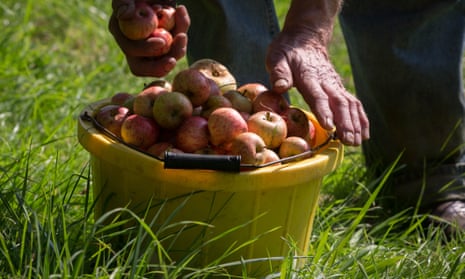Orchards in one of Britain’s biggest cider-making regions face being bulldozed because the drinks giant Heineken is pulling the plug on apple-growing contracts.
The Dutch brewer – which has owned Herefordshire-based Bulmers since 2008 – uses around a third of all the cider-apples grown in the UK. About 180 orchard owners, mostly based in Herefordshire, supply the fruit.
Improved productivity, an oversupply of UK-grown apples and a shift among drinkers to sweet fruit ciders has resulted in a glut of the bittersweet apple varieties that make up the backbone of traditional mass-market fare, such as Heineken’s Strongbow.
Heineken, the biggest cider producer in the world, is negotiating compensation packages to buy some growers out of their long-term contracts, leaving a question mark hanging over the future of their trees.
Grove Farm, at Kimbolton, Herefordshire, has been supplying Bulmers’ cider presses with apples for almost 60 years, recently contributing an annual 50 tonnes.
Tim Bunting, who has managed the farm since 1983, said he is desperately seeking a buyer for this year’s harvest after Heineken cancelled his contract in February. Bunting fears he may have to bulldoze his 70-year-old orchard – home to seven traditional bittersweet apple varieties, such as Brown’s, Vilberie and Dabinett – and turn it into farmland.
He said: “I’m loth to get the bulldozers in but that would be the easiest option. I have to be realistic.”
Bunting explained he had an annually renewed “supply agreement” with Heineken, which does not warrant a compensation buyout.
A neighbouring farmer, Colin Rogers, 71, is in the same predicament after Heineken refused to renew his contract. He said: “We need to find a home for this year’s harvest. A few small-scale cider-makers have shown some interest but they only want a tonne or so at a time.
“It’s possible we’ll have to bulldoze the trees. Heineken have said not to be so drastic but what are we supposed to do with all the fruit? You can’t leave so many apples on the ground if you’re using it for grazing – they’ll kill sheep. I’ve seen cows drunk from eating too many.”
Heineken said it was speaking to growers on a case-by-case basis, pointing out that some agreements were due to expire naturally.
A spokesperson for the company, which in the UK processes more than 100,000 tonnes of apples a year, said: “Heineken is committed to Herefordshire, investing £58m over the past few years to upgrade our operations. We have positive long-term relationships with our growers, supporting them to improve the productivity and sustainability of their orchards.
“We’re working closely in partnership with our growers and are committed to ensuring a sustainable long-term supply of cider apples.”
